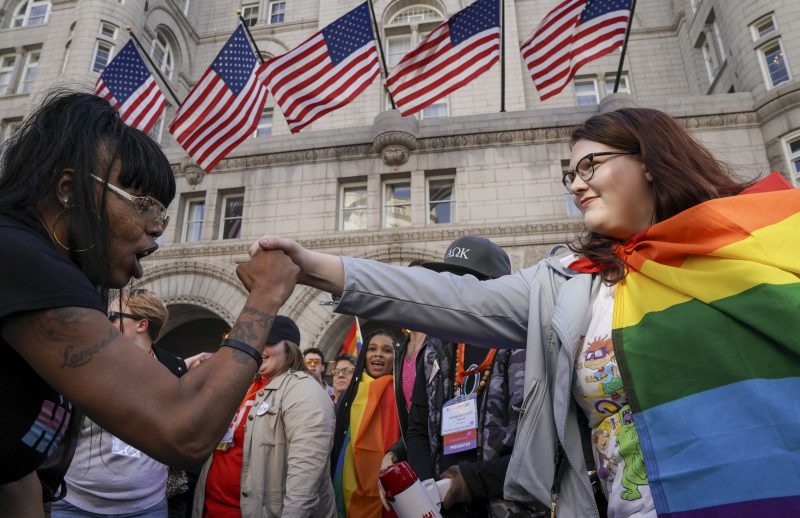In January, the UCLA School of Law’s Williams Institute in concert with Clark University published an analysis of perceptions among LGBTQ Floridians of their state’s new law targeting discussion of same-sex relationships in schools. The sample size was relatively (and probably necessarily) small, a bit over 110 parents in the state who identify as LGBTQ+. But the findings were still dramatic: more than half indicated that they’d thought about leaving the state and 1 in 6 had already made plans allowing them to do so.
“It is absolutely terrifying living in Florida and it has gotten progressively worse,” one respondent to the survey said. “We have been discriminated against and verbally attacked in the past in Florida. Now that we have kids, we are much more concerned about our safety and the well-being of our kids.”
For some reason, this survey was picked up last week by the website “Florida’s Voice,” a right-leaning organization that often echoes and amplifies the rhetoric of Florida Gov. Ron DeSantis (R). It tweeted out its summary: “Survey finds majority of ‘queer parents’” — scare quotes in the original, of course — “consider leaving Florida because of law barring sexual orientation/gender identity instruction in K-3.”
That legislation was signed into law by DeSantis last year and is poised to be expanded to all grade levels. On Saturday evening, DeSantis staffer and adviser Christina Pushaw shared the Florida’s Voice tweet with her followers, adding only one thing: An emoji of a hand waving, presumably goodbye to those parents concerned about the legislation.
The Williams Institute estimates that there are about 770,000 LGBT residents of Florida, or about 4.6 percent of the adult population. About a quarter of them are parents. Florida has a slightly higher percentage of LGBT residents than the U.S. overall, according to Williams Institute analysis. Other states with higher densities of LGBT residents are all ones that have voted Democratic in recent presidential elections.
It’s generally understood that DeSantis’s political efforts at the moment are largely focused on the 2024 Republican presidential nominating contest, making it somewhat less odd for an adviser of his to seem to want to push 1 in 40 state residents (a bit over half of the 4.6 percent who are LGBT) out the door. But just because targeting LGBTQ Americans likely bolsters DeSantis’s position with his party’s primary electorate doesn’t mean that it’s risk-free — particularly over the long term.
One of the underlying tensions in American politics at the moment is that the country’s older and younger populations differ both demographically and politically. Younger Americans are less likely to be White and more likely to be gay or trans. They’re also much more likely to vote for Democrats. For an older, Whiter, more Republican electorate, Black, gay, Hispanic and trans people can serve as a useful foil.
This is not an accident, as the New York Times reported on Sunday. After the Supreme Court legalized same-sex marriage — and particularly after it overturned Roe v. Wade — right-wing activist groups needed a new organizing target. Terry Schilling of American Principles Project told the Times that his movement “threw everything at the wall” to find something that mobilized their base. Schilling’s organizations did polling to figure out what messages were most effective. And what they landed on will not surprise you, if you’ve been tracking the national conversation: a focus on transgender Americans, particularly in amateur sports, was a winner.
Even by the time that research was conducted in 2019, this was a focus of some prominent voices on the right, like Donald Trump Jr. In recent months, though, targeting transgender people specifically and LGBTQ Americans more broadly has become a central focus of right-wing politics, including at its violent fringe. In recent days, it has involved a loud backlash against Bud Light, after the beer company included trans influencer Dylan Mulvaney among participants in a recent marketing campaign.
Polling conducted by Pew Research Center last year demonstrates where the political value lies. It’s not just that Republicans broadly think American society has gone too far in accepting transgender people (which 6 in 10 do). It’s that Americans generally are split on the question. A majority, however, thinks that transgender people should have to compete in sports based on the gender they were assigned at birth.
The Republican-controlled House is considering legislation this week that would target sports programs that allow “men” to participate in sports programs designed for women or girls — with sex “recognized based solely on a person’s reproductive biology and genetics at birth.” In Pew’s polling, 60 percent of Americans believe that being a man or woman derives from that original assignation, up from 54 percent in 2017.
But that polling also showed a wide split in views of transgender acceptance based on age. Americans aged 50 and up were 10 to 12 points more likely to say that society had gone “too far” than that it had not gone far enough. Adults under the age of 30 were 16 points more likely to say society hadn’t gone far enough.
The question for the Republican Party, then, is the extent to which a focus on transgender Americans further cements the opposition of younger Americans — who will in coming decades make up most of the national electorate.
Part of what’s happening here is that LGBTQ and particularly transgender Americans make up a relatively small part of the population. In Florida, for example, the Williams Institute estimates that about 100,000 adult residents are transgender, about 0.2 percent of the adult population. What’s more, the granting of basic protections to transgender and even LGBTQ Americans is much younger than, say, our doing so for Black Americans. A small population that can be framed as having been granted novel rights is a potent target for a political movement centered on traditionalism and against perceived change.
Doing so may yield intermediate term political benefits, including in 2024. February analysis from Gallup, however, found that 1 in 5 members of Gen Z identify as LGBT, including 2 percent who identify as trans. How are they likely to view the right’s focus on LGTBQ Americans over the long term?



























